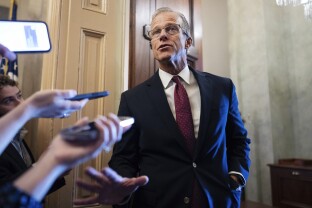The Senate is entering its final days of a showdown over President Donald Trump’s backlog of nominees.
There’s no sign of how or when it will end — and not even Republican leaders seem to have a sense of how many nominees would appease President Donald Trump, who is calling on senators to cancel their August recess and stay in town just to confirm his picks.
When asked on Tuesday how many nominees Trump would be satisfied with getting done this week, Senate Majority Leader John Thune told NOTUS that leaders were “having discussions” with the administration.
“I don’t know that we’ve settled on just exactly what that is,” Thune said. “But I think we’re trending in the right direction in terms of getting the list of priorities that they want, and being able to share those with the Democrats.”
“We’ll see where it lands,” he added.
Trump has more than a hundred nominees outstanding. Getting all of those nominees confirmed in the Senate this week, or even in the next few weeks, is incredibly unlikely. That leaves senators trying to find a sweet spot between how many they could actually get through the Senate if they stayed all August, how many Democrats would accept and how many it would take to avoid Trump’s ire.
Democrats can object to speeding up nominees, and consistently have this term, filibustering all but Secretary of State Marco Rubio’s confirmation. Republicans have blasted their counterparts as obstructionists, contending that civilian nominees especially have historically been sped up through unanimous consent.
Now, with just a couple days left before they’re supposed to leave town, lawmakers are looking to strike a deal.
Senate Minority Whip Dick Durbin on Tuesday said there’s “communication” between Thune and Senate Minority Leader Chuck Schumer over what a potential nominees deal would look like, including how many nominees might be considered for swift advancement.
“As to whether they’ve disclosed publicly the number, I can’t say,” Durbin said. He added that the question for Democrats remains the “quid pro quo,” meaning, what will they get out of it?
When NOTUS asked Sen. John Hickenlooper what he knows about a potential deal, he said he knew of “a lot of committees and commissions that haven’t been fully filled, that haven’t sat Democrats.”
“I know that there’s a lot of money that’s been held back and hasn’t been sent out,” he said. “So I know there were a bunch of different people trying to get resolution on some of those issues.”
Some Republicans have their own thoughts on potential paths forward, even including discussions to change chamber rules as a long-term means to speed up nominations. But for now, Sen. Markwayne Mullin told NOTUS there’s 55 nominees that have come out of committees on a bipartisan vote. He thinks they should be prime targets.
“There’s no reason why we couldn’t do every one of them,” Mullin said. “If they came out in a bipartisan manner, there’s no reason why we can’t get it done.”
Sen. Josh Hawley said do “all the judges, personally” and “confirm all of the lifetime appointments.”
“After that, I think we’re kind of reaching the point where, to our Democrat friends, I think the choice is going to be either quit filibustering all these people, or we’re going to recess the Senate and the president is going to fill up the rest of his administration with recess appointments,” Hawley said.
Trump has pushed for recess appointments repeatedly during his term, something Senate Republicans have avoided by staying in session for long stretches of time, and holding pro forma sessions during their small spurts of recess — a tradition Democrats and Republicans have accepted over the years.
Several Republicans have said they’d be concerned with or outright opposed to recess appointments, which would allow Trump to unilaterally confirm his nominees without a vote. The House, which has already left town, would also need to vote on a formal adjournment resolution for Congress writ large to make those appointments possible. Those dynamics make the whole prospect unlikely.
In turn, some Senate Republicans are openly siding with Trump’s demand that they stay in town to work through the confirmations.
Sen. Mike Lee, for example, made several X posts calling for the Senate to delay recess and “clear the confirmation backlog,” and to only adjourn if Democrats intend to allow Trump to make recess appointments. Trump reposted a screenshot of one of Lee’s posts on Saturday, writing: “Very Important. Republicans must play to win. Clear the 135. So badly needed!”
But most senators aren’t so eager to stay in town.
The chamber has spent months in lengthy legislative sessions, with a fraction of the normal days off senators usually get.
Losing August would be an undeniable blow for many senators who want time away from the Capitol — with their loved ones, in their districts or on scheduled congressional delegation trips around the world.
Despite the alleged obstruction from Democrats, Republicans have managed to confirm a record number of nominees for this point in the term. But senators contend that’s because of the sheer volume of votes imposed on the chamber, not because of collaboration.
“The reason why we pass the record number is because Thune had said this from the beginning, ‘We can do it the hard way or we do it the easy way,’” Mullin said. “They chose to do it the hard way.”
Sign in
Log into your free account with your email. Don’t have one?
Check your email for a one-time code.
We sent a 4-digit code to . Enter the pin to confirm your account.
New code will be available in 1:00
Let’s try this again.
We encountered an error with the passcode sent to . Please reenter your email.


